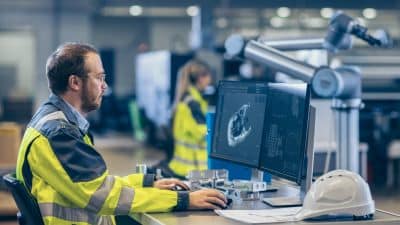Technology has become an integral part of modern life, profoundly influencing the way we live, work, and interact. The rapid advancement of technology has ushered in numerous benefits, but it also brings its fair share of challenges.
The History of Technology
The concept of technology and its inventions have evolved over millennia. The term “technology” encompasses a wide range of tools and innovations that have been developed over time.
Over 3.3 million years ago, the origins of technology predated the emergence of our own species. At Lake Turkana in Kenya, archaeologists have uncovered multiple tools. These include sharp stone flakes, fashioned into knives, and larger unshaped stones, used as hammers and anvils.
These primitive tools, created at a time when our ancestors like Australopithecus roamed the Earth, provide glimpses into the ancient roots of technology. These roots form the basis of what we have created now.
Watch this video for a short insight into what we will be exploring in this article.
Pros of the Advancement of Technology
Efficiency and Productivity
One of the most significant advantages of technology is the boost in efficiency. Tasks that once took hours, if not days, can now be completed in mere minutes. This increased efficiency has revolutionized industries, making production and operations more streamlined and cost-effective.
In civil engineering, modern technology has given rise to machines that handle tasks like cement mixing and even foundation construction, streamlining these essential processes.

These innovations epitomize the industry’s embrace of advanced technology, making once labor-intensive tasks more efficient and precise.
Communication Revolution
Technology has transformed the way we communicate. With the advent of the internet and smartphones, we can connect with people worldwide at the touch of a button. This has not only made the world a smaller place but has also facilitated global collaboration, knowledge sharing, and real-time communication.
Consider EIT as an example. Today, online students attend webinars where the lecturer may be from Spain, Turkey, or even the USA. This level of global connectivity and accessibility would have been unimaginable centuries ago.
Medical Breakthroughs
The healthcare industry has seen incredible advancements thanks to technology. From improved diagnostic tools to robotic surgeries, technology has significantly enhanced patient care and increased life expectancy.

Automation
Automation has been a game-changer for various sectors. Manufacturing, engineering, logistics, and agriculture, among others, have benefited from automated processes, reducing the need for manual labor. This results in increased precision, consistency, and a reduction in workplace injuries.
For example, Computer-Aided Design (CAD) is used in many engineering fields such as Mechanical, Electrical, Civil, Electronics, etc and is a software accelerates the design process and minimizes errors.
Convenience and Accessibility
Technology has made life more convenient. Smartphones, e-commerce, digital services, and on-demand information access have simplified daily tasks and made information more accessible.
People can now shop for groceries, order meals, or book transportation services with a few taps on their smartphones.
Education Revolution
Technology has expanded the horizons of education. E-learning, online courses, and educational apps have made learning more interactive and accessible. Students can access a wealth of information and resources.
For instance, a student pursuing a degree in Mechanical Engineering can enroll in an online course with EIT, that offers in-depth webinars, course material, online libraries and remote labs.

The Cons of the Advancement of Technology
Privacy Concerns
In the digital age, privacy has become a paramount concern. Personal data can be easily accessed, shared, or misused, leading to concerns about surveillance and cybercrime.
Imagine a scenario where a person’s personal information, including their financial records and medical history, is stored in an online database. A security breach occurs, and unauthorized individuals gain access to this sensitive data. Subsequently, the individuals’ financial accounts are compromised, and their medical history becomes exposed.
However, there are multiple ways to ensure you are cyber secure.
Job Displacement
Automation, artificial intelligence, and robotics have the potential to replace many jobs. This trend creates job insecurity for those in positions that can be automated, which can result in economic and social challenges.
In the field of engineering, automation and robotics are transforming the manufacturing and assembly processes. Consider an automotive manufacturing plant that previously relied heavily on manual labor for tasks like welding and painting.
However, with the introduction of advanced robotic arms and automation systems, these tasks can now be performed with greater precision and efficiency.

Social Isolation
The increasing reliance on technology for communication has the potential to isolate individuals. Face-to-face interactions are reduced, and there’s a risk of reduced social skills and increased feelings of loneliness.
For example, people now can connect with friends and acquaintances through social networks, sharing updates, and engaging in online conversations. While this has expanded the reach of communication, it has also led to changes in how individuals interact.
Environmental Impact
The production and disposal of electronic devices contributes to a growing problem: electronic waste (e-waste). Additionally, the energy consumption of technology, including data centers and cryptocurrency mining, has a significant environmental impact.
Health Concerns
Excessive screen time and technology use can lead to various health issues. These may include digital eye strain, poor posture, physical inactivity, and even addiction to technology.
Moreover, the sedentary nature of technology use can contribute to physical inactivity, which is associated with various health problems, including obesity and cardiovascular issues.
Inequality
The digital divide is a genuine concern. Not everyone has equal access to technology and the opportunities it offers. This disparity exacerbates socio-economic inequalities, limiting access to education and job opportunities for some.
Consider a scenario where a rural community lacks access to high-speed internet and modern technology.
The residents of this community face significant challenges in accessing online educational resources, participating in virtual job training programs, or seeking employment opportunities that require digital skills.
Technological advancement is a double-edged sword. While it has unlocked tremendous opportunities and improved our quality of life in many ways, it also presents challenges and potential drawbacks.
Striking a balance and addressing these issues is essential to maximizing the benefits of technology while mitigating its negative consequences. It’s an ongoing conversation that continues to shape our modern world.
References
Eight Negative Impacts of Technology
What Are The Top 10 Advantages of Technology and Disadvantages


